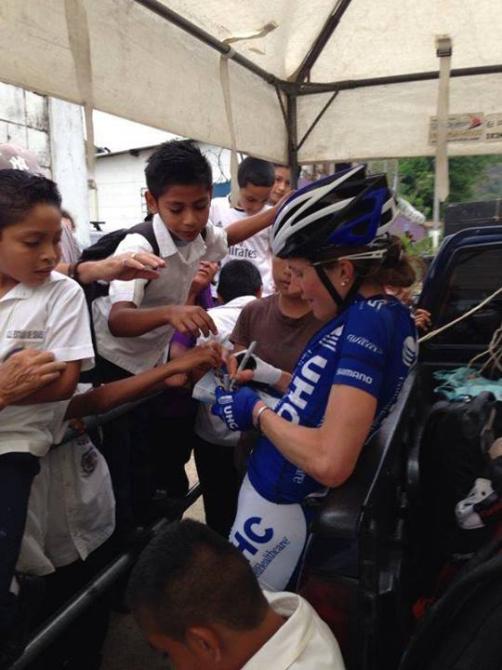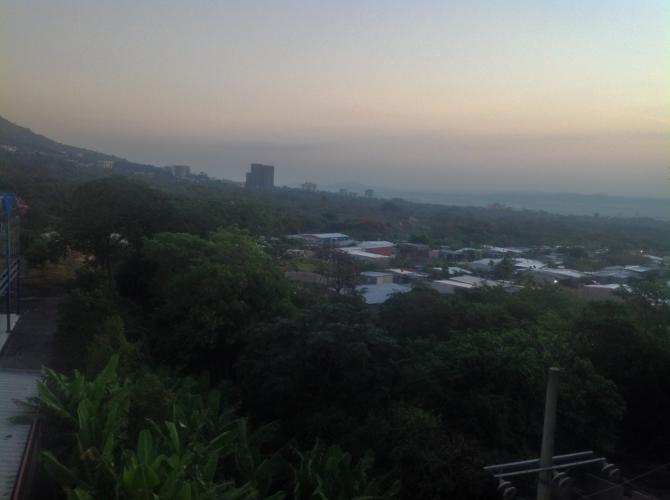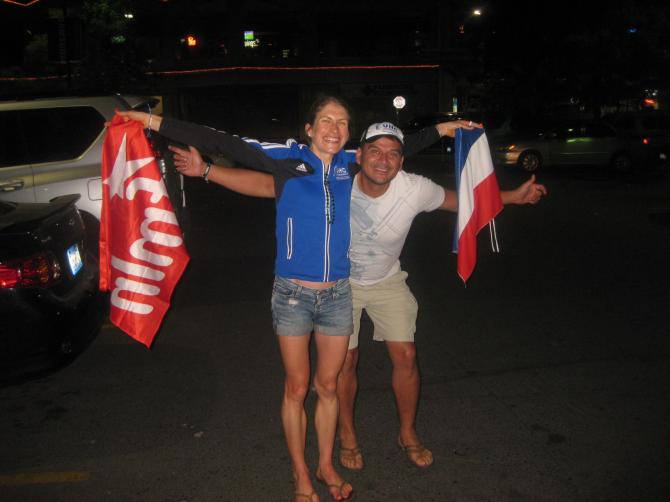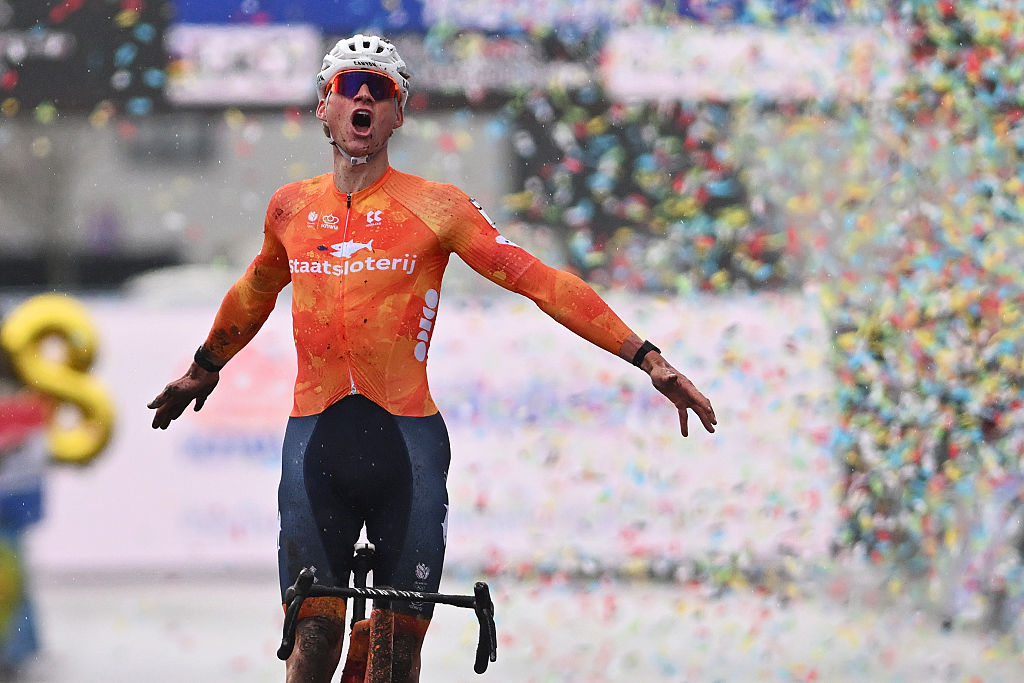Trusting in El Salvador
Abbott on winning more than just a bike race



As a professional athlete, I realize that I have been given a tremendous gift. I not only get the chance to compete at the highest level in my sport and to do so with an amazing team, I get to travel the world while doing so. This grants me opportunities to learn and grow personally, and hopefully positively influence and impact the bystanders, witnesses or fans.
Earlier this month, I had the opportunity to compete in this year’s Vuelta El Salvador. I am so proud that the team was able to return home with the victory, but perhaps equally thrilled by the experience that came alongside it.
The queen stage at the Vuelta El Salvador finished in a climb. Not just any climb, but a 14km climb up a volcano with an average gradient of 10% and maximum (multiple) pitches of 21%. Oh boy.
The night before the queen stage, “The Boss” (my coach, Dean Golich) gave me a piece of advice. Dean reminded me that "it is more important to be a good person than a good bike racer". Given the importance of the next day, this might seem a bit of a non-sequitur, but I hardly wonder about Dean's advice anymore. As usual, “The Boss” was right.
There is always more than the race at stake. Looking back, his lesson was the overarching theme of those two weeks of creatively interpreted race distances, rice cookers in hotel rooms, an air conditioner that sounded like a prop plane on takeoff, fresh fruit in the streets, an elevator episode during a power cut, and a set of rich new relationships that took us all completely by surprise.
Trust
We arrived in El Salvador the evening of March 4th and were picked up by a smiling Charlie - who wasn't involved in the race exactly, but rather worked for a local radio station, Radio Femenina. It turned out that various local organizations had been solicited to sponsor a team with vehicles and transport for the two weeks, and Radio Femenina had been assigned to the UnitedHealthCare women's team. On the face of it, this was a little terrifying.
The latest race content, interviews, features, reviews and expert buying guides, direct to your inbox!
We were staying at a hotel that was not really walking distance to anything, so we were now dependent on "the radio guys" for transport to the store (critical when meals were served only sporadically), transport to the stages, and protection on our training days on roads that would not win any awards for a bike-friendly town. If they didn't happen show up for a stage... we didn't really have any recourse. If they wanted to hang out and have lunch after a race was over, then we were going to as well. And given they had real jobs to tend to, if they didn't have time to take our fabulous hotel room chef Veronica to the grocery store for the 13th time, we might be ordering Domino's El Salvador for dinner…again. A lot was at stake.
Exhale. Release. Trust.
Teamwork... without control
The reliance on new and outside help was disquieting, because frequently at big races, a team demonstrates success and confidence by precisely how well they are able to conquer and control a race environment. The work our team staff put in to make sure our riders have everything they need, that the sponsors are well represented, and that disasters are averted, is just incredible. Cycling team staff members are truly amazing in their dedication and I am so grateful for all of the help I have gotten and continue to get with every race day morning.
The exact same routine with the exact same characters will take place anywhere a race sets up. The more the riders have access to a schedule and amenities identical to those at home, the better. The faster you get to a hotel after a stage, the bigger the advantage you have over your competitors. The more specific order that exists within each clean team car, the more you can feel you have won before you even start. It is a construct that we all come to trust as a path to success.
In reality though, as much we hate to admit it we really don't have control over much of anything. Dynamics change within a race, cars break down on the way to the start line and massive life events arrive to unceremoniously knock us entirely off our feet. As much as the athlete with perfect control and discipline is held up as an example, I would actually contend that it is the athlete who is adaptable and unattached to the concept of "should" who will be a long-term champion through change and adversity. I believe that as critical as it is to develop good habits, it may be still more important to hone the ability to relinquish them without even a moment's notice.
In the end, the point is this: for all of our fears and a few misadventures in the end we unanimously agreed that working with our radio guys during the Vuelta El Salvador was the highlight of the trip.
Letting Go
That which keeps you in control and safe can also limit you. So often I leave a race hardly noticing where I have been, because my team has so deftly replicated our recipe for success.
However in this case, working so closely with local residents of the host country we actually got the opportunity to know a bit of El Salvador. And I loved it. We had someone there to cheer for us and be astonished by us whether we were first or 50th. They took us to dinner for International Women's Day. I had a limitless opportunity (much to my non-Spanish-speaking teammates' likely serious irritation) to interview Carles and Roberto ad nauseum about the election that took place during our stay (though I also extended that privilege to the security guards, the anti-doping representative, the cleaning lady, and the old ladies at the fruit stand, to name an embarrassingly small fraction of my hapless interviewees).
I adore my time in Latin America, where racing and life seems to have the curious property that nothing goes exactly to plan, but everything seems to always work out in the end. I love it because it requires me to have faith and it makes me come alive. It teaches me that winning is not equivalent to controlling and that your ability to trust and let go is what enables you to be successful – on and off the bike.
We had the astonishing fortune of getting to interact with people who gave us a true face of El Salvador. I like to hope that they grew from the experience too, as they learned about cycling tactics and protocol, got to be a part of the winning team, and gave broad positive exposure to their radio station. Unfortunately, during the third stage of the race a helicopter landing at the finish crashed. One man, David Diaz, a friend and colleague of our new compatriots was killed in the accident. In this moment, we were called on to offer our generous new friends the best support we could in their loss as well. We got to be people in addition to bike racers.
In the end, with my spectacular team behind me, we won that stage up the volcano, and ultimately took home the entire race. But as much as I love being able to bring home a victory my team worked so hard to set me up for, as much as I love climbing mountains as fast as my bike will take me--even as much as I was honored and grateful to be able to use that victory as a tribute to David in support of our new friends--that might not be what sticks with me the most.
We parked in front of a small family's tin hut at the start of one of the stages, and after our mechanic Adrian had set out and wiped clean all of our race Wiliers, we caught a glimpse of the daughter of the family wiping her own small rusty bike clean with a rag. Maybe that girl...or maybe the hug Carles gave me after he gave me my own El Salvador political party flags to take home as souvenirs our last night in the country might last in my heart longer. My true gratitude is this: due to new friends, my amazing team and the hospitality of a country, I didn't have to choose between being a bike racer and a person. At least for those two weeks, I was both.
